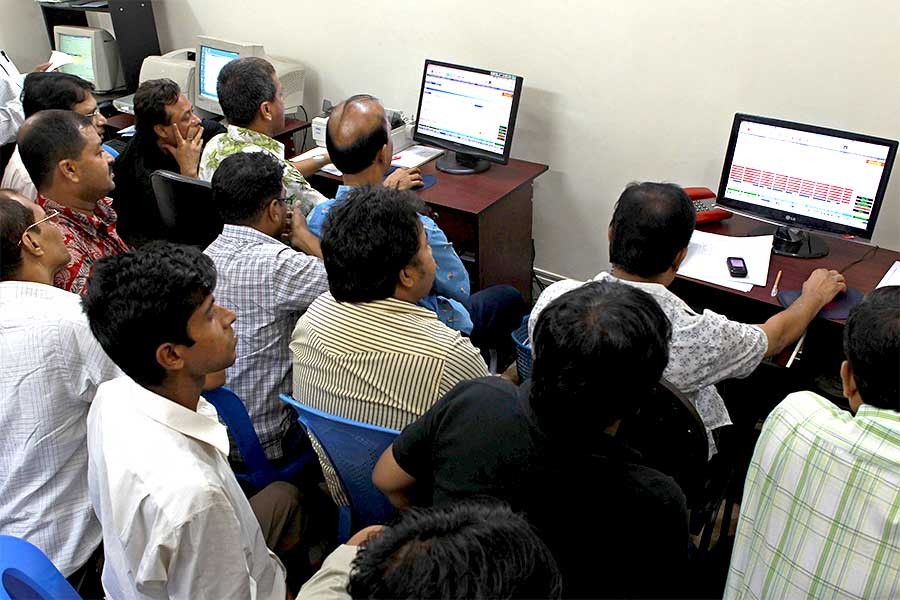Belying the hope that the scope of the people to investment in the stock market would be widened over time, the same seems to have shrunk.
One may think that, as initial public offerings (IPOs) and mutual funds are coming to the market every year, the scope for stock market investors should have widened by now. But this is a very simplistic view based on arithmetical logic only. Listing of more IPOs with the bourses does not necessarily leads to widening of scope of options for the stock investors. More important to note is, how many of the IPOs listed with the bourses offered quality stocks which investors can stake with their long-term investment. An analysis on the quality of the IPOs that made debut in the last three years would show that most of these came from the textile sector and turned into trash, in most cases, within a year or so. Now, some day-traders play gambling with such stocks; they do not stake their money in them from the perspective of a long period.
Opening of a large number of mutual funds also does not mean that investors have more of the options. Mutual funds are not new stocks, they are mutually owned funds by the unit holders managed by so-called professionals with other people's money. Mutual funds are meant mostly for the non-informed investors who leave their money in favour of fund managers. But ironically, the fund managers in the Bangladesh stock market let the investors down. Only three to four fund managers could have earned trust of the investors, others failed them measurably.
Many investors who left their money with the fund managers now feel they made a mistake. In fact, the so-called fund managers are not at all professionals. They are swindlers of the investors' money. A government-owned investment company is also included in the list of fund managers who have lost trust of the investors.
After failing in the close-end mutual funds, some fund managers have switched to the open-end mutual funds management. The reason why one after another fund manager is opting for the open-end mutual funds is that these funds are less taken note of by the stock investors do not take much interest in them. Besides, these are not listed with the bourses, and the investors who invest in them are satisfied with low dividends per unit.
Large number of mutual funds should ideally mean availability of more money for investment. But is our stock market big enough to accommodate more money for investment through mutual funds?
The crux of the problem is the shortage of quality stocks in the market. The quality stocks are to come from or to be made available through IPOs. But very few quality IPOs were listed with the bourses in the past several years.
Now, if more investors, whether directly in persons or through investing in the mutual funds, enter the market can the market supply them with appropriate stocks? This writer does not think so. He, instead, thinks that prices of the junk stocks will go up in the coming days as more money will be chasing them. If a balance cannot be maintained between the demand for and supply of good stocks, there will be a rise in the prices of all stocks. In such a situation, the gamblers will rule the roost. The Bangladesh Securities and Exchange Commission (BSEC), the regulator of stock markets, is trying to raise the awareness of potential stock investors through seminars and lecture sessions. Does the BSEC think that the deficit in the knowledge of the stock market investment is the main problem? Definitely lack of knowledge on the part of the investors is a problem but investors, if trained poorly, may bring more harm than good to the market.
How many multinationals are listed in the Dhaka Stock Exchange (DSE)? Did the BSEC seriously try to bring them to the market? The Ministry of Finance also did not play its due role. The Grameen Phone was the last multinational to come to the listing with the bourses. It was in 2009, and since then no other multinational seriously thought of coming to the listing. Wherefrom the investors, including the ones being freshly educated by the BSEC, will have quality stocks to have stake in?
In the past, there were eight mutual funds which were well managed by Investment Corporation of Bangladesh (ICB), and this segment of the mutual funds was more lucrative for investors. Those mutual funds offered dividends up to 800 per cent per unit to the investors. But they are no more there. Under a regulatory order of the BSEC they were delisted, and they are now open-end funds which no investors take seriously.
Unless the market is supplied with more of quality stocks, pushing up the prices of stocks through pumping in more money may bring more harm than good.
Recently many investors were found to be unhappy with the Bangladesh Bank, as the latter took actions against some commercial banks which broke the regulatory ceiling of investment allowed for banks in the stock market. But unhappy investors should know that the Bangladesh Bank is to oversee the banks' activities.
The writer is Professor of Economics, University of Dhaka.


